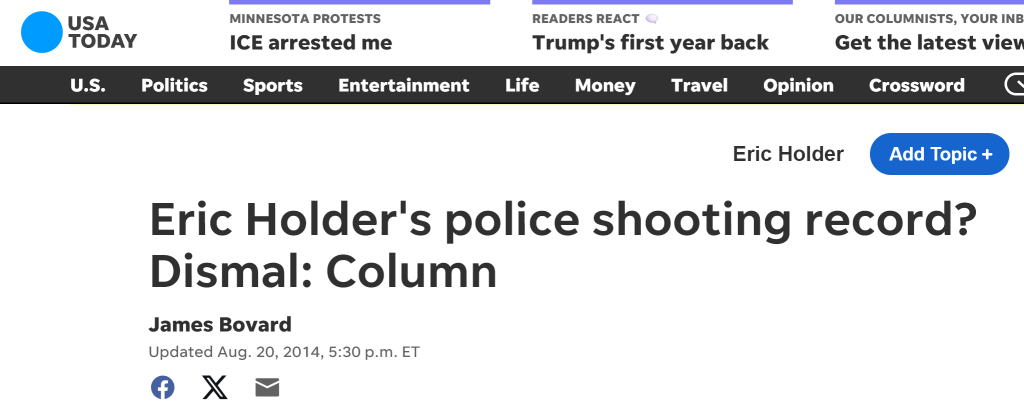Eric Holder’s police shooting record? Dismal: Column
by James Bovard August 20, 2014
When the attorney general had the chance to be tough on police shootings, he did next to nothing.
Attorney General Eric Holder arrives today in Ferguson, Missouri, in response to the unrest after a local policeman shot 18-year-old Mike Brown. Holder assured the people of Missouri: “Our investigation into this matter will be full, it will be fair, and it will be independent.”
But Holder’s own record belies his lofty promise. As the U.S. Attorney for the District of Columbia from 1993 to 1997, Holder was in charge of policing the local police. When police violence spiraled out of control, he did little to protect D.C. residents from rampaging lawmen.
The number of killings by D.C. police doubled between 1988 and 1995, the year 16 civilians died due to police gunfire. D.C. police shot and killed people at a higher rate than any other major city police department, as a Pulitzer Prize-winning Washington Post investigation revealed in late 1998. The Post reported that “Holder said he did not detect a pattern of problematic police shootings and could not recall the specifics of cases he personally reviewed.” Holder declared: “I can’t honestly say I saw anything that was excessive.”
There was such a dearth of oversight from Holder’s office that D.C. police failed to count almost a third of the people killed by their officers between 1994 and 1997. Even when police review boards ruled that shootings were unjustified or found contradictions in officers’ testimony, police were not prosecuted. In one case, a police officer shot a suspect four times in the back when he was unarmed and lying on the ground. But Holder’s office never bothered interviewing the shooter.
Some of the most abusive cases involved police shooting into cars – a practice which is severely discouraged because of the high risk of collateral damage. Holder told the Post: “I do kind of remember more than a few in cars. I don’t know if that’s typical of what you find in police shootings outside D.C.” Actually, “more than 50 officers over five years had shot at unarmed drivers in cars,” the Post noted, and D.C. police were more than 20 times as likely to shoot at cars than were New York City police. Reports about some of the shootings were tainted by police perjury.
Shortly after Holder became U.S. attorney, a local judge slammed the D.C. government for its “deliberate indifference” to police brutality complaints. In 1995, the Civilian Complaint Review Board, which purportedly investigated alleged police abuses, was shut down because it was overwhelmed by a backlog of accusations from aggrieved citizens. Despite the collapse of the system’s safeguards, Holder’s office remained asleep at the switch. Even assistant D.C. police chief Terrance Gainer admitted: We shoot too often, and we shoot too much when we do shoot.”
Holder is now trumpeting the need for openness, but in the 1990s he acceded to pervasive secrecy on lawmen’s killings. The Post noted: “The extent and pattern of police shootings have been obscured from public view. Police officials investigate incidents in secret, producing reports that become public only when a judge intercedes.”
While Holder largely ignored killings by police, Holder lobbied the D.C. City Council for mandatory prison sentences for anyone convicted of possessing a gun. He also lobbied the D.C. City Council to impose mandatory minimum prison sentences for nonviolent drug offenders, including a prison sentence of up to 5 years for anyone possessing more than 1.5 ounces of marijuana. The PR bonanza from those initiatives helped Holder snare a promotion to Deputy Attorney General in 1997.
The Post series sparked an uproar which resulted in the Justice Department Civil Rights Division investigating D.C. police shootings from the prior 5 years. And who did Attorney General Janet Reno put in charge of that effort? Eric Holder. His office denied that any conflict of interest existed, instead insisting that Holder’s “oversight of the review signifies the importance of this endeavor to the Department of Justice.” Local lawyer Michael Morgenstern, who had sued DC police in such cases, scoffed that Holder “had the opportunity to do this when he was there, and now all of a sudden, they’re sending him back to do the same job he didn’t do while he was there.”
As the smoke clears in Ferguson, Missouri, Americans have no reason to presume that either the local police or the feds have the market cornered on truth or justice. But Eric Holder’s record should raze any presumption that our attorney general deserves the benefit of the doubt on passing judgment on police shootings.
James Bovard is the author, most recently, of a new e-book memoir, “Public Policy Hooligan.”
On Twitter @jimbovard


A shocking article. These bureacrats are not elected – they report to no one. This is the tip of the ice berg